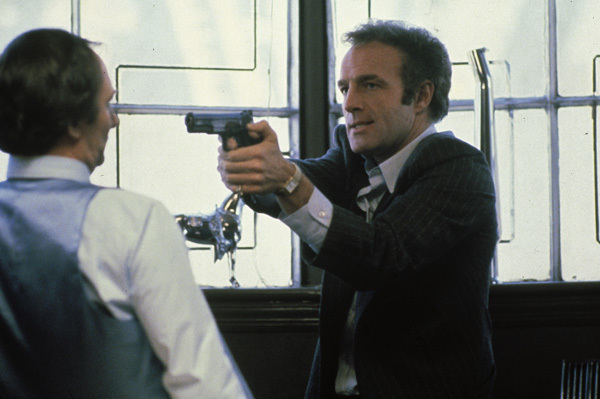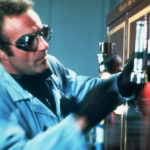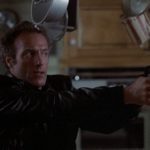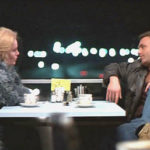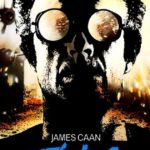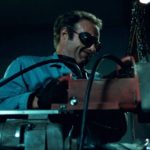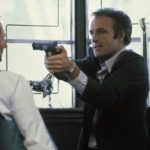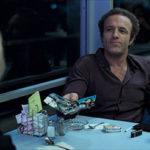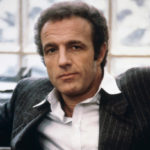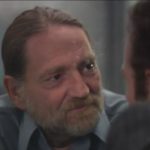7 years on from The Godfather part 2, James Caan was at the height of his powers when in 1981 he starred in Michael Mann’s debut feature, a heist movie called Thief.
In essence Mann created for this movie a simple neo-noir thriller plot where the heist is developed slowly and, contrary to the Oceans series, without the knockabout humour you might have expected from many films labelled “heist.”
In fact, Mann pays homage to his forefathers while developing his own voice, always a wise choice. There are touches of Scorsese, but the real nods are to Rififi and The Killing, both from the mid-50s and both true noir: gritty and hard as nails.
Here is a summary of the plot: Like Sonny Corleone, Caan’s character, secondhand care salesman Frank is a hothead . He is also an old-fashioned safecracker specialising in ice (ie. diamonds) and cash, who has spent 13 year behind bars. When Frank’s fence, Joe Gags is caught skimming and is murdered by the mob, Frank plays the hard man to get his money back from Attaglia (Tom Signorelli.)
Attaglia’s boss Leo (the excellent Robert Prosky, by turns sweet and savage) gives him back his money persuades a reluctant and independent Frank to work a tough job for Mafia, with the promise of megabucks. This Frank does, but instead of getting his dosh he is fobbed off with stock in shopping malls and the expectation that he will do more jobs for the big man.
Frank objects and leaves no doubt that he wants his money ASAP. Leo then pulls rank and has Frank beaten up. Frank is not the sort to take this lying down, so he sends his wife (Tuesday Weld) and adopted boy (courtesy of Leo) out on the road, torches his home and all his known hangouts, and breaks into Leo’s mansion. There he kills all the guards and shoots Leo into submission, taking one gunshot wound in return. He then walks off into the night, destination unknown.
But for the safecracking and Mafia hits, there’s a lot about the plot that reminds me of the Tom Waits song Frank’s Wild Years, but for the fact that Caan’s Frank is very much fighting for his independence, which proves to be worth more than the rest of his life put together. Mann’s visualisation of the character, and Caan’s quote about Frank makes for interesting reading, courtesy of Wikipedia:
Mann made his directorial debut with the TV movie The Jericho Mile. This was partly shot in Folsom Prison. Mann says that influenced the writing of Thief:
“It probably informed my ability to imagine what Frank’s life was like, where he was from, and what those 12 or 13 years in prison were like for him.. The idea of creating his character, was to have somebody who has been outside of society. An outsider who has been removed from the evolution of everything from technology to the music that people listen to, to how you talk to a girl, to what do you want with your life and how do you go about getting it. Everything that’s normal development, that we experience, he was excluded from, by design. In the design of the character and the engineering of the character, that was the idea.
“I always find it interesting, people who are aware, alert, conscious of what they do and are pretty good at it… People who want to put in 50-60 hours a week and go home and are not really conscious of life moving by, don’t really interest me very much… As part of the curriculum designed for an actor getting into character, I try to imagine what’s going to really help bring this actor more fully into character. And so I try to imagine what experiences are going to make more dimensional his intake of Frank, so that he is Frank spontaneously when I’m shooting. So one of the most obvious things is it’d be pretty good if [James Caan] was as good at doing what Frank does as is Frank.”
James Caan’s emotional several-minute monologue with Weld in a coffee shop is often cited as the film’s high point, and Caan has long considered the scene his favorite of his career.The actor liked the movie although he found the part challenging to play. “I like to be emotionally available but this guy is available to nothing.”
The point that Frank’s soul is vacuous comes across well in the final scene, though even in the coffee shop scene you are struggling to identify the centre of his existence, what he really cares about, if anything:
“I don’t care about me, I don’t care about nothing.”
In short, don’t expect too much meaning from Mann’s script; focus on the action, since that is where the director film delivers, far more than his vague attempts at emotional intensity. Perhaps the greatest success is the extent to which Caan masters the technical wizardry of safe-cracking, both in talking through the method for breaking even the toughest safes, and in the assured precision of his engineering work drilling the box or applying a thermal lance.
While the critics generally liked this film, one weakness recorded was its failure to develop the subplot about Willie Nelson‘s Okla, stuck in prison until released on medical grounds. With this I agree, since Nelson demonstrates surprisingly excellent skills as a character actor. In this case, more would have been more.
Not bad, but could have done better. Not the best heist movie either, but certainly worth a visit along the way.

